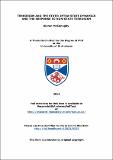Files in this item
Terrorism and the state : intra-state dynamics and the response to non-state terrorism
Item metadata
| dc.contributor.advisor | English, Richard | |
| dc.contributor.advisor | Rengger, N. J. (Nicholas J.) | |
| dc.contributor.author | McConaghy, Kieran | |
| dc.coverage.spatial | 234 | en_US |
| dc.date.accessioned | 2015-04-22T14:37:28Z | |
| dc.date.available | 2015-04-22T14:37:28Z | |
| dc.date.issued | 2015-06-23 | |
| dc.identifier | uk.bl.ethos.644848 | |
| dc.identifier.uri | https://hdl.handle.net/10023/6535 | |
| dc.description.abstract | Although there has been a wealth of academic literature which has examined counter-terrorism, both in the general sense and in case study focused approaches, there has seldom been an engagement in terrorism studies literature on the nature of the state itself and how this impacts upon the particular response to terrorism. Existing literature has a tendency to either examine one branch of the state or to treat (explicitly or implicitly) the state as a unitary actor. This thesis challenges the view of the state as a unitary actor, looking beneath the surface of the state, investigating intra-state dynamics and the consequences for counter-terrorism. I highlight that the state by its nature is ‘peopled’, demonstrating through comparative analysis of case studies from Spain, France, and the United Kingdom, how the individual identities and dispositions of state personnel at all levels from elites to entry level positions determine the nature and characteristics of particular states. I show that if we accept that the state is peopled, we must pay attention to a series of traits that I argue all states exhibit to understand why campaigns of counter-terrorism take the shape and form that they do. I posit that we must understand the role that emotional and visceral action by state personnel in response to terrorism plays, how the character of particular state organisations can impact upon the trajectory of conflicts, and how issues of intra-state competition and coordination can frustrate even the best laid counter-terrorism strategies. Furthermore, I show how the propensity for sub- state political violence to ‘terrorise’ populations makes the response to terrorism a powerful political tool, and how it has been deployed in the past for political gain rather than purely as an instrument to improve security. I conclude that future academic analyses of counter-terrorism must take this into consideration, and likewise, state personnel must be mindful of the nature and character of their state should they wish to effectively prevent terrorism and protect human rights and the rule of law. | en_US |
| dc.language.iso | en | en_US |
| dc.subject | Terrorism | en_US |
| dc.subject | Counter-terrorism | en_US |
| dc.subject | The state | en_US |
| dc.subject | Political violence | en_US |
| dc.subject | Northern Ireland | en_US |
| dc.subject | Spain | en_US |
| dc.subject | Basque | en_US |
| dc.subject | France | en_US |
| dc.subject | Algeria | en_US |
| dc.subject | Ireland | en_US |
| dc.subject | United Kingdom | en_US |
| dc.subject | Security | en_US |
| dc.subject | Ethno-nationalism | en_US |
| dc.subject | Nationalism | en_US |
| dc.subject.lcc | HV6431.M3 | |
| dc.subject.lcsh | Terrorism | en_US |
| dc.subject.lcsh | Terrorism--Prevention | en_US |
| dc.subject.lcsh | State, The | en_US |
| dc.subject.lcsh | Political violence | en_US |
| dc.title | Terrorism and the state : intra-state dynamics and the response to non-state terrorism | en_US |
| dc.type | Thesis | en_US |
| dc.type.qualificationlevel | Doctoral | en_US |
| dc.type.qualificationname | PhD Doctor of Philosophy | en_US |
| dc.publisher.institution | The University of St Andrews | en_US |
| dc.publisher.department | Centre for the Study of Terrorism and Political Violence | en_US |
This item appears in the following Collection(s)
Items in the St Andrews Research Repository are protected by copyright, with all rights reserved, unless otherwise indicated.

